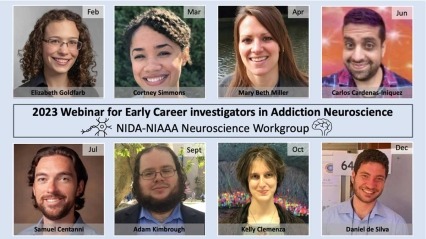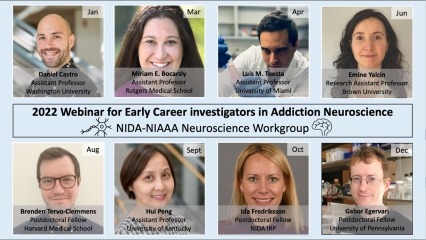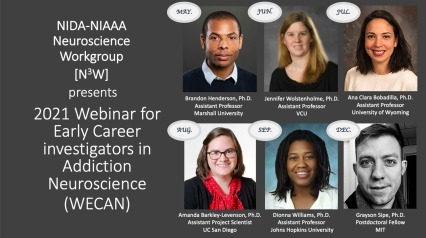What We Do:
The mission of the NIDA-NIAAA Neuroscience Workgroup [N3W] is to provide a forum to facilitate the discussion and development of neuroscience research programs to understand, prevent, and treat substance abuse and addiction. The N3W membership is composed of extramural and intramural staff from NIDA and NIAAA who have broad interests in understanding the neuroscience of addiction. Workgroup members provide a diverse representation in basic, pre-clinical, clinical and epidemiological research, and in science policy and grants administration.
The Workgroup achieves its mission at the NIH by promoting discussions of emerging research and policy issues relevant to the neuroscience of substance use disorders [SUD] across Divisions, Offices and Institutes, and for the public by supporting the dissemination of current knowledge on emerging areas of the neuroscience of substance abuse through workshops and seminars. Towards the latter, N3W hosts a Cutting-Edge Seminar Series which is held at the NIH, and presents the Joint NIDA-NIAAA Frontiers in Addiction Research Mini-Convention as a satellite event in association with the annual meeting of the Society for Neuroscience. The public is encouraged to contact the Workgroup with ideas to promote the neuroscience missions of NIDA and NIAAA.
Addiction to drugs and alcohol has been termed a brain disease. This concept drives NIDA’s and NIAAA’s neuroscience research programs. Fundamental knowledge obtained through basic and pre-clinical neuroscience research has identified brain and nervous system mechanisms that contribute to the development of substance use disorders and the vulnerability to addiction. Thorough understandings of the neurobiological mechanisms that underlie addictive behaviors are critical for the development of pharmacotherapeutic approaches and behavioral interventions towards the effective treatment of SUD. The incidence and prevalence of substance use in vulnerable populations guides specific areas of neuroscience research on SUD. Clearly, research on the neuroscience of addiction benefits when multiple expertise and viewpoints are considered. Consequently, the interests of the membership of the N3W embrace and draw from a broad range of areas of scientific inquiry to discuss current and future directions for research on the neuroscience of addiction.
Webinars by Early Career investigators in Addiction Neuroscience (WECAN)
In efforts to fostering young investigators in the alcohol and SUD research fields, the N3W hosts monthly Webinars by Early Career investigators in Addiction Neuroscience (WECAN). WECAN is a collaborative webinar series organized by NIDA and NIAAA Program Officers. WECAN provides opportunities for early career scientists to showcase their research in a short virtual presentation.
2023 WECAN speakers:
- Elizabeth Goldfarb, PhD. Assistant Professor, Yale School of Medicine.
Mnemonic and glucocorticoid mechanisms underlying risky drinking. - Cortney Simmons, PhD. Postdoctoral Researcher, Yale University.
Development in context: Examining how environmental conditions moderate the association between externalizing disorders and working memory. - Mary Beth Miller, PhD. Assistant Professor, University of Missouri School of Medicine.
Sleep as a prospective predictor of alcohol-related harm. - Carlos Cardenas-Iniguez, PhD. Postdoctoral Fellow, University of Southern California.
Lessons learned from the ABCD Study on responsible use and generalizability in diverse populations. - Samuel Centanni, PhD. Assistant Professor, Wake Forest University School of Medicine.
An insula-centric view of the interaction between stress and alcohol drinking. - Adam Kimbrough, PhD. Assistant Professor, Purdue University.
A role for the Cortical Amygdala in Alcohol Use Disorder. - Kelly Clemenzaarsly, Ms. PhD Student, Albert Einstein College of Medicine.
TBD. - Daniel da Silva, PhD. Visiting Postdoc, Laboratory on Neurobiology of Compulsive Behaviors, NIAAA IRP.
TBD.
WECAN organizers
NIDA
- Olivier Berton
- John Fedota
- Jessica Mollick
NIAAA
- Mohammed Akbar
- Dominique Lorang-Leins
- Ben Xu
Past WECAN speakers
2022 Speakers
- Grayson Sipe, PhD. Postdoctoral Fellow, Massachusetts Institute of Technology.
Astrocyte-neuron crosstalk: a link between arousal disorders and addiction? - Daniel Castro, PhD. Assistant Professor, Washington University in St. Louis.
Next-generation approaches for neuropeptidergic research on affect and motivation. - Miriam Bocarsly, PhD. Assistant Professor, Rutgers New Jersey Medical School.
Neural circuitry underlying anxiolytic effects of alcohol - Luis Tuesta, PhD. Assistant Professor, University of Miami Miller School of Medicine.
Role of microglia in drug craving and relapse - Emine Yalcin, PhD. Research Assistant Professor, Brown University.
Effects of Chronic Alcohol and Cigarette Smoke Exposures on White Matter Sphingolipids and Neurobehavioral Function
2021 Speakers
- Brandon Henderson, PhD. Assistant Professor, Marshall University.
Tobacco and vaping flavors alter dopamine neurons and contribute to addiction-related behaviors. - Jennifer T. Wolstenholme, PhD. Assistant Professor, Virginia Commonwealth University.
Binge Drinking in Adolescence: Epigenetic Dysregulation of Frontal Cortex Development and the Influence of Social Isolation. - Ana Clara Bobadilla, PhD. Assistant Professor, University of Wyoming.
Reward-specific ensembles in the nucleus accumbens core - Amanda Barkley-Levenson, PhD. Assistant Project Scientist, University of California San Diego.
Translational genetic strategies for identifying novel therapeutic targets for alcohol use disorder - Dionna W Williams, PhD. Assistant Professor, Johns Hopkins University.
Cocaine and Antiretroviral Therapy Efficacy.
- Grayson Sipe, PhD. Postdoctoral Fellow, Massachusetts Institute of Technology.
Sponsored Activities:
Contact:
- Shang-Yi Anne Tsai (NIDA), Co-chair
- John Matochik (NIAAA), Co-chair



